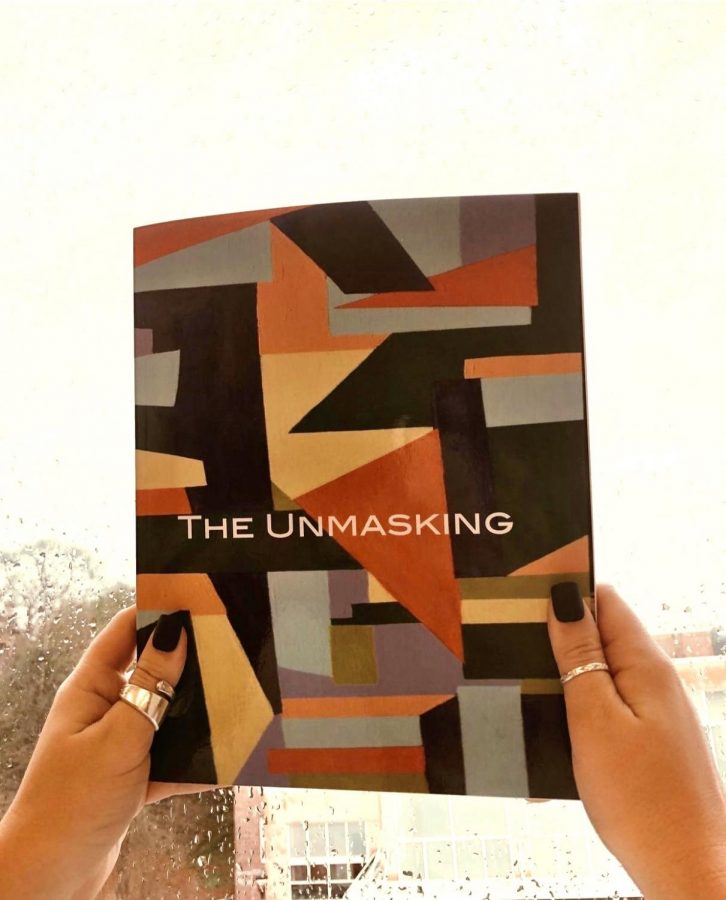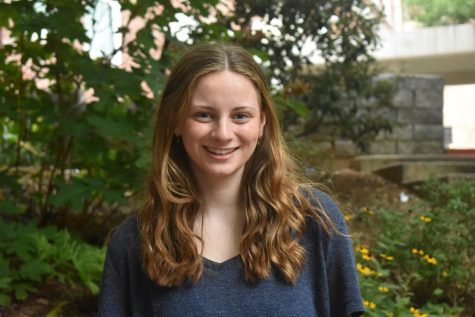Virtual transition opens up new doors for Literary Magazine
Courtesy of MaryElizabeth Villalpando
The last published printed edition of Grady’s literary magazine, The Unmasking, from January 2020.
May 24, 2021
From completely transitioning to an online format to adapting even more differences, Grady’s literary magazine, “The Unmasking,” has endured substantial changes this year.
With the majority of the school year taking place online, the magazine’s staff have not had access to its usual Adobe Creative Cloud software programs, which are normally used to create the magazine’s content. As a result, the staff’s focus shifted focus from an all-print magazine to a new, virtual platform.
“We would usually use the InDesign platform to create all of our spreads,” said senior and Co-Editor-in-Chief Emma Menzies. “We would put it into a program called Blurb Book Creator to get a physical book that would be around 100 pages long, but this year we don’t have access to the school computers that have those programs. So, we used other programs and created a website through WordPress and uploaded all of our spreads to the website, making a totally virtual edition.”
The switch to an online platform came with brand new challenges specific to the logistics of the class.
“Making spreads is definitely a learning curve for beginners, and it’s really hard to give people the help that they need over Zoom,” senior and Co-Editor-in-Chief Abby Edlein said. “It’s also difficult to not have that creative energy bouncing around the classroom constantly.”
Grasping a new format of publishing via a website and creating spreads was hard to adapt to while working from home, according to staffers.
“Learning all of these new applications without having done it before is very difficult,” junior and Co-Editor-in-Chief Maddie Hoffman said. “For the actual WordPress website, you have to learn it before you do it, and sometimes, it will make you want to throw your laptop out of the window. It definitely takes a few weeks to get it.”
Navigating the new platforms was hard enough for the editors, but teaching it to the staff was a different struggle.
“Trying to teach WordPress and everything else to the class was pretty hard,” Edlein said. “They would ask questions, and we wouldn’t know how to answer them. So, it’s definitely been difficult, but rewarding because we now have a tangible website.”
The creation of the website undoubtedly saved “The Unmasking” from being dormant this year, according to staffers. Without it, no one would be able to see the work done in the class.
“Last year, when we went home, we were still planning on making a book for that time period, but we didn’t have access to Blurb Books during that time,” Menzies said. “So, we made a PDF of what that book would look like, but we never printed it because we didn’t have access to the printer.”
Despite the difficulties the school year brought, there was an unexpected upside to going virtual. Unlike in past years, “The Unmasking” was able to save money.
“We got to save a ton of money this year, because as you can imagine, publishing all those books is way more expensive than a fifteen dollar a year WordPress account,” Edlein said. “We are losing the profit off of the printed copy, but we don’t end up making that much off of the books because we sell them for what they cost and just a little bit to make a small profit.”
However, “The Unmasking” never fully relied on the profits from printed copies. In the past, literary magazine advisor MaryElizabeth Villalpando said the staff found other ways to raise money, such as bake sales.
“Most of our funds come from fundraising,” Villalpando said. “We try to sell the books at cost and not much more because we want families and students to be able to afford them.”
This year, the website has opened up multiple doors for “The Unmasking,” including enhanced creativity. Edlein said the heart of the magazine never changed, but moving online has allowed for new aspects to be integrated.
“We are still doing basically the same thing,” Edlein said. “We have one thing: we do writing and then we make a spread for the writing. But, we have been able to get even more creative this year than ever before because we are able to put in gifs or videos or animations, and we were able to have a lot more fun with that.”
Along with the writing and design components, the photography aspect of the magazine has also been adapted to fit a virtual school year.
“With people not really traveling and stuff, compared to last year’s photos, it’s definitely a big difference,” Hoffman said. “It limits some of the photography, but people have still found really great ways to make do with what they have. In some ways, photography has downgraded, but in some ways, it has gotten a lot more creative.”
The website has allowed the literary magazine to reach a larger audience than previously, according to Hoffman.
“Last year, when I bought my “Unmasking” book, I would obviously let my friends then look at it when we were in school, but now with it being online, I can just send them the link to the website and tell them to check out my poem,” Hoffman said. “It’s also definitely easier for other family members of mine and people who don’t even go to Grady to look at our work.”







